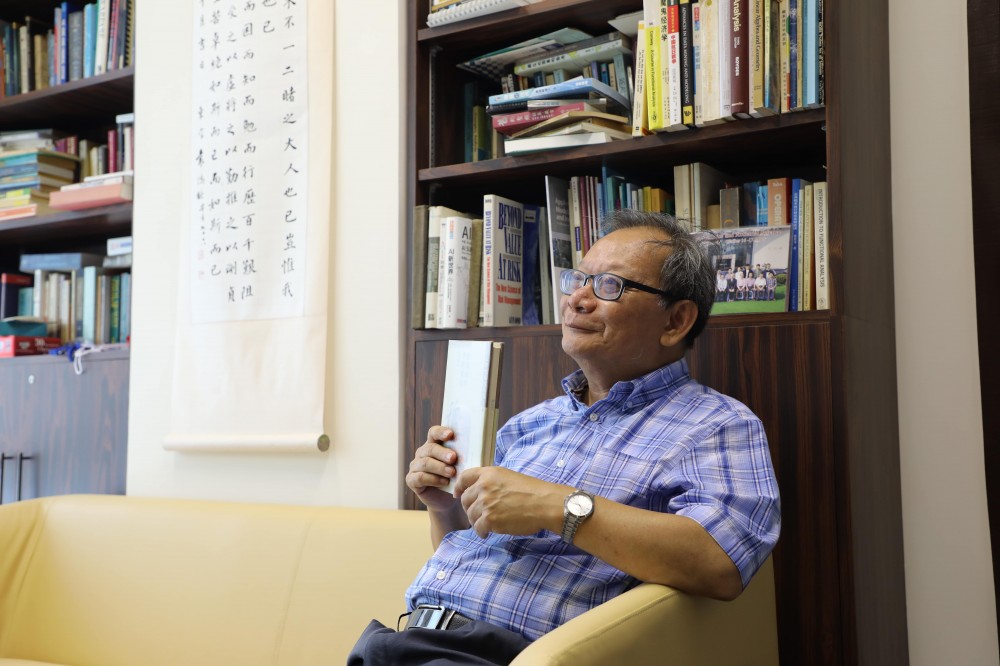Advancing step by step to tackle challenges before us

People who have known me for some time know that I am an admirer of Zeng Guofan (曾國藩, 1811-1872), one of the most important ministers of the late Qing dynasty who is best known for suppressing the Taiping Rebellion in the middle of the 19th century. The famous Chinese intellectual Liang Qichao (梁啟超, 1873-1929), who lived through the last of the imperial dynasties of China to the early republican era, once said that Zeng Guofan was considered a great person not only by Chinese history, but by the world stage as well. “Zeng’s vision saw beyond the currents of the mainstream. He accumulated great wisdom through overcoming hardships, encouraged himself to continue to make progress, and remained unyielding in the face of difficulties. He never took shortcuts, but advanced step by step in a steadfast manner,”* wrote Liang.
I admire Zeng for the perseverance and diligence he demonstrated throughout his extraordinary political career and personal life that, at one point, brought restoration to the declining Qing dynasty. I believe these two qualities are not only pivotal for a statesman like Zeng, but are equally germane to our jobs as academics and educators. At a higher institution like EdUHK, the need to persevere at our jobs has never been as acute as it is now amid the unprecedented challenges of the 21st century. Such issues include how to make the world a sustainable place to live amidst increasingly severe climate crises, how to orientate ourselves amid changes brought about by quantum evolution in technology and the rapid disappearance of old things both tangible and intangible.
Starting from January this year, climate-related disasters such as forest fires, floods, and heatwaves have cost thousands of human lives and huge physical damages. Dr Norman Cheung Kin-wai from the Department of Social Sciences and Policy Studies (SSPS), a trained climatologist, has been closely following climate change issues over the past two decades. In this issue of FLASS FORWARD, he shares with us his thoughts on the climate crisis and the dire consequences he anticipates if we do not act now. He advises us on what people should do to ameliorate the effects of climate change.
Dr Prudence Lau Leung-kwok from the Department of Cultural and Creative Arts (CCA) specialises in research on modern architecture and the architectural movements in early 20th century Hong Kong and mainland China. In recent years, she has shifted her research and teaching focus from architectural history to heritage conservation and heritage education. In our newsletter she discusses why protecting historical sites, buildings and monuments is important to a modern city like Hong Kong, and how we can help preserve and transform our heritage into an organic part of people’s lives.
While heritage maintenance in a rapidly-developing city like Hong Kong is never easy, the benefits it brings can be priceless. Earlier this year, a group of primary school students in Queen’s Hill of Fanling joined a heritage exploration project designed by a team of scholars and students from SSPS. Under the project, the primary schoolers visited the Lung Yeuk Tau Heritage Trail and organised an exhibition to showcase their learning about the rich historical and cultural legacies of the trail. Through these activities, these young students built a stronger sense of belonging with their community.
If heritage connects people spatially with the past, music gives us moments of comfort and solitude in a world of constant change. Appreciating the solace music provides, my colleagues at CCA dedicate themselves to enriching our students musically and encouraging them to do their best in music. Two CCA students tell us about how their initial interest in becoming a conductor has grown and blossomed. Under the mentorship and support of their teachers, they have now experienced conducting a full orchestra in a public event.
Academics always take a moment to consider what constitutes a good research project. In this issue, Dr Andy Tse Choi-yeung from the Department of Health and Physical Education gives his account on why doing physical exercises is important, and what elements a research work should have to make it substantial. This year, the faculty introduced the Outstanding Research Postgraduate Student Award. The two awardees — Ms Venus Liu Hok-ling and Ms Yang Yin — relay the joys and difficulties they experienced during their research projects.

In July, I was invited to feature on a radio programme, where I gave my views on liberal arts education and the strengths of this faculty. When facing the many challenges ahead of us, whether those are political, environmental or social, I believe we need a framework to orientate ourselves and know where we stand. This is where liberal arts education comes in. I like learning from history, literature and philosophy, the three disciplines that form the backbone of liberal arts education. In this regard, the late Zeng Guofan has left us a rich legacy of his words, deeds and personality. His story serves as a constant source of wisdom from which we can draw upon, to advance step by step and tackle the challenges before us.
It will soon be the mid-Autumn festival. This is a time for family reunions and celebrations. I hope you all enjoy delicious bites of mooncake, steaming cups of Chinese tea, and many happy times during this moonlit holiday.
Professor Li Wai-keung
Dean of FLASS
29 September 2023
Note:
*「…其一生得力在立志,自拔於流俗,而困而知,而勉而行,曆百千艱阻而不挫屈;不求近效,銖積寸累,…」From the preface of The Selected Works of Zeng Guofan, selected and edited by Liang Qichao (梁啟超輯《曾文正公嘉言鈔》)